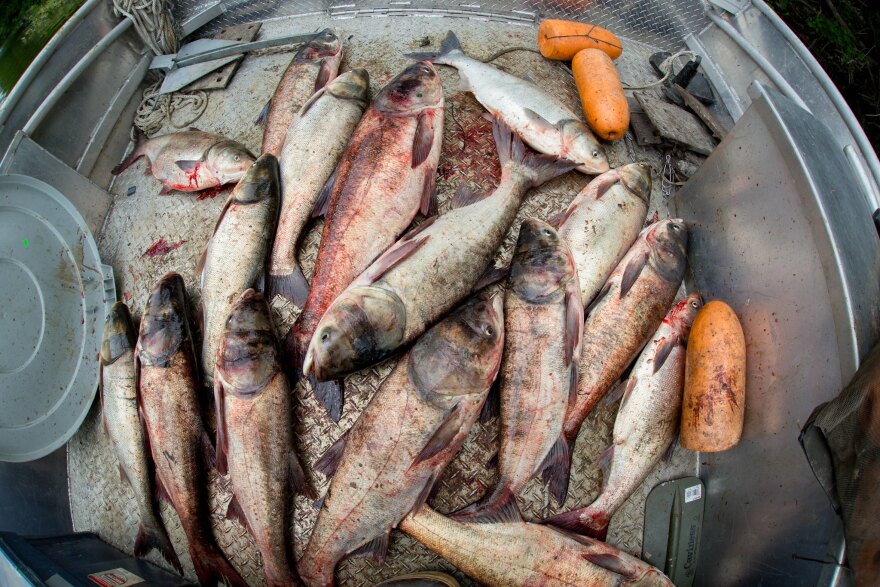At a lock and dam site in the suburbs of Chicago, there’s a plan to build a set of booby traps to keep invasive carp from reaching the Great Lakes.
It would involve a barrier of bubbles, an electric field, underwater speakers, and a price tag of over $800 million dollars.
Right now, invasive carp, often called Asian carp, live in Illinois just a few dozen miles from Lake Michigan.
They’re found throughout the Mississippi River basin where they outcompete native species and wreak havoc with recreational boaters.
Garret Ellison, who covers the environment for MLive, spoke with IPR News about the proposed project, and what’s at stake if these fish find their way into the Great Lakes. This is an excerpt from the conversation.

IPR: Just to start off, for listeners who might not be familiar with the invasive carp, can you describe these fish?
GE: There’s silver carp and bighead carp. And those are the two that are coming up through the Illinois waterway system.
Silver carp are the ones that leap out of the water when they’re disturbed. And that’s a big concern. Because if you’re driving a boat through an area with fish that leap out of the water — that’s a safety hazard.
I actually listened to a senior water policy advisor at the Michigan DNR literally start to tear up at the idea of kids potentially being injured by leaping silver carp.
So there’s a big worry amongst Michigan officials about what that could mean for the recreational boating industry.
IPR: And I wanted to ask you about how carp are able to outcompete native fish, sort of by not being very picky about what they eat, and why that’s especially a concern in the Great Lakes.
GE: If you think of them in the Great Lakes, that doesn’t mean they’ll just populate the lakes themselves. They would push into watersheds.
And so, what happens when you have this fish that gobbles up everything in its path? And you’ve got a whole hoard of them suddenly pushing into Michigan rivers and outcompeting native fish in the areas where they’re spawning?
That’s the big concern really. What happens when the Asian carp come and outcompete the lake trout and the salmon, the steelhead? What happens to those fisheries? What happens to the charter fishing industry? People aren’t going to be chartering boats to go catch Asian carp.
IPR: So there’s a project in Illinois to erect a barrier to keep carp from reaching the Great Lakes. Can you tell me a little about what’s planned there?
GE: There’s a really big infrastructure project near Joliet, Illinois which is kind of a suburb of Chicago. They want to reconfigure this lock and dam on the De Plaines River, at this place called Brandon Road Lock and Dam.
They want to reconfigure that with a whole gauntlet of deterrents that would keep the fish from coming into the lock and moving upstream towards Lake Michigan.
There’s a flushing mechanism that would force the fish away with water. There’s acoustic deterrents, meaning they would blast fish with sound. There’s air cannons. It really is a gauntlet. That’s the best description I’ve seen of it.
It sounds like a giant booby trap. A giant set of booby traps.
Right, a layered defense system, but it’s in this one spot.
But it’s upstream of existing deterrents. In fact there’s an electric barrier. The Army Corp created this place that the fish—in order to get past this electric barrier—they would have to survive getting zapped basically. It electrifies the water.
The Army Corp says that thing works just fine. And we don’t really need the Brandon Road Lock and Dam.
But at the same time, there have been live fish found above the existing electric barriers. And they don’t know how they got there. They didn’t fly. So what does that mean? Conservation groups and states like Michigan say we need additional protection. That’s what the plan is for Brandon Road.
And does anyone think we could be too late. If this takes another decade to finish that invasive carp might already make it into the Great Lakes?
That’s a worry. What if this is closing the barn door after the cows get out? And it’s not as if nothing is being done to stop carp in the meantime.
One of the things the state of Illinois argues has been pretty effective at controlling carp is they essentially pay commercial fishermen in the Illinois River to fish down the population. Just take as many out of the river as possible at the leading edge where silver and bighead carp have advanced and keep as far south as they possibly can. In the meantime, by catching all of these fish, we can enable a market for them.
Yeah, eat the invasives.
Right. I’ve had Asian carp. I wouldn’t say it’s the greatest tasting fish I ever had. But it certainly wasn’t the worst. What I had was like a carp cake. It tasted like crab cake. It wasn’t bad I could see people eating it. It was an interesting thing to experience. You hear about the carp so much. You read about them, you write about them. Now you get to taste them.




